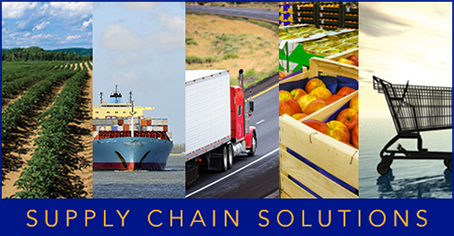Reliable Fulfillment
Consistent on-shelf availability of fresh produce is the key to customer satisfaction and retention.
Product availability—and the avoidance of customer defection—is the outcome of a concerted fulfillment effort among suppliers, logistics service providers, and retailers. All must collaborate to understand demand, establish consistent product flows, and maintain cold chain integrity.
Reliable fulfillment begins with accurate forecasts; growers and shippers must provide insights regarding weather, harvest timing, and other considerations that affect produce availability. Retailers need to share information on sales history, promotional plans, and related factors that will influence demand. As much as possible, the goal is to be demand driven—and this means adopting a customer focus.
“Understanding and forecasting consumer demand is the critical starting point,” explains Meijer’s Graham. “Start with the consumer and work upstream. Product should move in concert with demand from the consumer; some products have longer lead times that need to be accommodated.”
Coordination of logistics activities is also necessary. Adequate transportation capacity, accurate inventory rotation, and timely picking and dispatch of orders are all elements of success. Though this sounds straightforward, the reliance on lean inventory levels, just-in-time delivery, and part-time labor can complicate the situation. A slight spike in demand or a scheduling error can quickly disrupt the supply chain.
“The margin for error is so small,” ob-serves Stark, “you can’t miss appointments; you can’t have the product sitting in the yard. You need coordination across all parties and everyone working in concert to get the product to retailers.”
Maintaining cold chain integrity, of course, is a fulfillment priority throughout the fresh produce supply chain. Temperature fluctuations in a truck, on the receiving dock, or a store backroom can lead to shelf-life degradation. These problems can be avoided through precooling practices, selecting the right transportation providers, and minimizing inventory dwell time. Here, SCC also plays a key role when organizations are willing to share their expertise with trading partners.
“Our quality control people work with retailer distribution centers and store managers to help them understand the cold chain and how they can handle product to decelerate decay,” explains Olsen. “We also offer a service for our customers to pick up their orders from multiple suppliers, take it to one of our consolidation centers, and have it ready when their trucks arrive. When the consolidated orders arrive at the customer’s warehouse, the product is fresher and shrink is decreased.”
Graham succinctly summarizes the importance of reliable fulfillment, noting “strong planning processes and even stronger execution will lead to high rates of on-shelf availability.”
Summary
As a longtime supply chain professional and educator, it is my natural bias to believe the initial claim of this article—supply chains make the store.
After talking to the experts and doing some additional thinking, however, it’s clear this statement needs to be tweaked slightly for accuracy. It is fair to claim that supply chain collaboration makes the store. Consistent on-shelf availability of produce is best achieved through a coordinated effort among partners who are willing to share their expertise for the benefit of the overall supply chain.
Remember, stores cannot ensure product availability on their own. They depend on the effective coordination of internal and external supply chain resources to generate timely flows of fresh produce from the field to store shelves.
Success is promoted when and if organizations all along the supply chain adopt cohesive goals, share accurate information, and establish reliable fulfillment processes. This will require both commitment and trust, but the results will be well worth the collaborative efforts.



